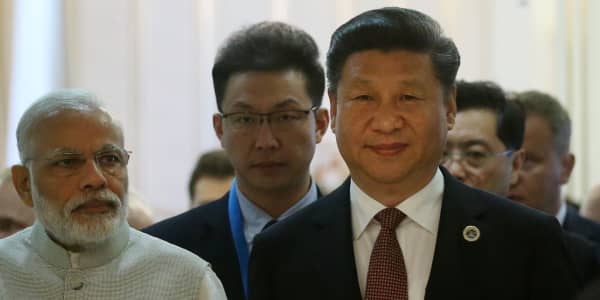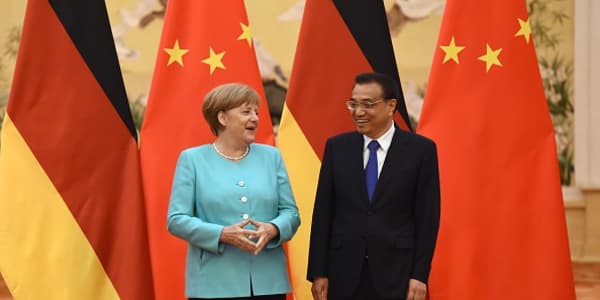
The allure of Brazil's commodities may be fading for China, but the world's second-largest economy is discovering new opportunities in the South American country.
Brazil has relied heavily on exports of raw materials to grow its economy, conveniently matching China's efforts to become the world's factory floor, with accompanying heavy use of commodities.
The relationship, however, has always been lopsided. Almost 18 percent of Brazil's imports came from China in 2015, while 18.6 percent of its exports headed there, according to data from IHS Markit. But just 2.8 percent of China's imports came from Brazil and only 1.2 percent of the mainland's exports headed there, the data showed.
As a result, Brazil has been hard-hit by the economic slowdown in China, as well as by the global drop in commodity prices over the past few years, Rafael Amiel, director for Latin American economics at IHS Markit, said. In July, the International Monetary Fund (IMF) said it expected Brazil's gross domestic product (GDP) would contract by 3.3 percent this year.
Amiel cited data that showed the value of Brazil's exports to China dropped from $46 billion in 2013 to $35 billion in 2015, although there had been a small recovery in the first half of 2016. About $26 billion of Brazil's exports to China in 2015 were soybeans, iron ore and oil, with the three products making up 75 percent of the total, he said.
Amiel noted that even as the value of the exports dropped, the volume had continued to rise, up 3.5 percent and 10.5 percent respectively in 2014 and 2015, although to little effect.
"In two years, Brazil lost almost $51 billion even when they shipped almost 15 percent more volume/products," he said in an email interview. "The other channel of transmission of the Chinese slowdown comes through fiscal revenue as government tax revenue declined because of lower exports and lower profits. In turn, government spending was constrained by this slower revenue."
China's exports to Brazil may also have slowed as tumbled in the wake of the country's deep recession, Amiel said, because it has made imported products more expensive. While China mostly buys raw materials from Brazil, the South American country tends to buy finished products from the mainland, with IHS Markit data showing telecom and electrical equipment among the largest import segments.
"China's growth will be less commodity-intensive in the next 15 years than in the previous 15," Louis Kuijs, head of Asia economics at Oxford Economics, said in a phone interview. "The problem globally is that there are no other countries with an economic size of China to pick up the baton"
That meant commodity prices were unlikely to post a solid recovery, Kuijs said. "That's hanging over the outlook on countries like Brazil."
This effect would will also hang over China's exports, Kuijs noted.
"China's export outlook has definitely been dented by weakness in countries like Brazil, Russia and other emerging markets," he said. "Emerging markets make up more than half of export revenues [for China]."
Kuijs noted that until recently emerging markets' demand for China exports were growing faster than developed markets,' but that was no longer the case.
Foreign direct investment optimism
There could be a small bright spot, however, in Brazil's economic troubles. The two countries currently have very little mutual foreign direct investment, but there are signs that could pick up.
Based on Chinese data, Brazil accounted for just 0.02 percent of foreign direct investment (FDI) into China in 2014, according to data from IHS Markit, while Chinese FDI into Brazil was "negligible" in 2014 and 2015, the consultancy said.
But macroeconomic researcher Business Monitor International (BMI) said in a July report that China's infrastructure companies had boosted their presence in Brazil's power sector rapidly over the past three quarters. BMI expected the trend to continue as Chinese companies tried to capitalize on business opportunities created by Brazil's recession.
"Brazil's fiscal consolidation efforts, coupled with higher interest rates to contain inflation amid a slumping currency, would encourage the Brazilian government and private companies to increase reliance on foreign capital," BMI said. It noted that in January 2016, Brazil agreed contracts for 30-year operating licenses on five hydropower concession lots, including 29 existing power plants.
China Three Gorges Corp. was the biggest buyer at the auction, investing 8.97 billion Brazilian real ($2.76 billion) to run two hydroelectric plants, making it the second-largest private power generator in Brazil, BMI said.
BMI noted that an ongoing corruption investigation into several Brazilian engineering, procurement and construction (EPC) companies would reduce domestic players' abilities to pay for ongoing projects or bid for new ones, opening the door to more Chinese competitors.
"Our country risk team believes Brazil's macroeconomic recession will further deepen in 2016 and expects the country's central bank policy rate to remain above 2014 levels over a multi-quarter period," BMI said. "In this context, we believe Chinese companies are well placed to capitalize on Brazil's continued need for power infrastructure, as they are typically more tolerant to risk than companies from the U.S. and Europe, which are not state-backed."
Follow CNBC International on Twitter and Facebook.
—By CNBC.Com's Leslie Shaffer; Follow her on Twitter @LeslieShaffer1





